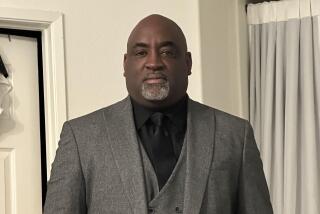Jesuits Use Some Innovative Thinking to Save the Dei
- Share via
When you need someone to get rid of rats, you call an exterminator. When you need someone to fix a leaking pipe, you call a plumber. When you need someone to save a school, you call the Jesuits.
Cardinal Roger Mahony placed the call last year. The Archdiocese of Los Angeles had run out of options in trying to figure out how to keep athletic powerhouse Verbum Dei High open.
“He asked for a miracle,” Father William Wood said. “The reality was the school was in financial trouble. People were ready to say, ‘We’ve got to close the school. It’s costing too much money and it’s going to get worse before it gets better.”’
The Jesuits have been involved in education for almost 500 years. They run 28 colleges and universities and 52 high schools in the United States.
The Jesuits wanted a year to study Verbum Dei’s problems before agreeing to take over the school.
Mahony told them, “I need you right now.”
Verbum Dei’s enrollment had dropped to 162 students. The archdiocese was providing $220,000 to help defray operating costs and another $500,000 to pay bills and expenses.
Mahony’s request to Wood was simple: “I want that school to stay open.”
But Wood and his fellow Jesuits had to come up with a plan to save a school in the heart of Watts known for its athletic success and ability to provide a college-prep education to minority students.
Wood had been working at the University of San Francisco before agreeing to become president of Verbum Dei. Another Northern California import, Scott Santarosa, had just been ordained as a priest. He became the school’s vice president of development. Together, they turned their attention to a first-of-its-kind school in Chicago, Cristo Rey Jesuit.
Cristo Rey requires its students to work five days a month at entry-level jobs for corporations. Their salaries are paid to the school to help defray tuition costs.
Wood and Santarosa decided to use the model set up by the Jesuits at Cristo Rey to save Verbum Dei. They have begun recruiting corporations to pay $25,000 for a team of four students to perform entry-level jobs such as filing, answering phones and doing office work.
“I think it will help kids in two ways,” Santarosa said. “It will lower tuition and give kids great work experience. They will begin to imagine themselves in a different world than the one they live in.”
Starting next year, tuition will drop from $3,500 to $2,000. But every Verbum Dei student will be required to work five days a month as part of the program. And athletes won’t be able to call in sick or offer an excuse for missing work if they have a game or practice. Work comes first.
“It’s a big controversy with our coaches,” Santarosa said. “We had a meeting and it didn’t go over well.”
Coaches are already having to adjust this season.
One day a week, students are going to training sessions in preparation for next year’s changes. They’re learning computer skills and techniques needed for clerical work. And they’re missing practice.
Football Coach Lalo Mendoza has been at Verbum Dei for 36 years. He said he has no problem losing players for practice if that’s what it takes to keep the school open.
“The well is drying up, so we have to find other ways to finance the kids’ education,” he said. “It’s something workable and is going to save this school. Anybody who coaches knows they always have to adapt and adjust and make do with what you have.”
It would be unacceptable to close Verbum Dei, not just because of its success in football and basketball. The all-boy school opened in 1962. It wasn’t touched during the Watts riots of 1965.
“It was looked upon as a beacon of hope for Watts,” Wood said.
Verbum Dei is a school preparing African-American and Latino teenagers for the chance to go to college.
The student body is 63% African-American and 37% Latino. Enrollment used to number in the 300s. It’s 191 this year.
The football team is 8-1. One of its graduates, Kenechi Udeze, starts as a freshman on the defensive line at USC.
The basketball team, which gained national prominence in the 1970s behind future NBA players David Greenwood and Roy Hamilton, should be as good as ever.
Verbum Dei graduates have gone on to become lawyers, doctors, policemen, firemen, teachers and politicians.
They’ve prospered because they received an affordable college-prep education at Verbum Dei.
Now it’s up to the Jesuits to keep the school running.
“The hard part is not building up a new school,” Wood said. “It’s to take an old school and transform it into this new way of doing things.”
*
Eric Sondheimer can be reached at eric.sondheimer@latimes.com
More to Read
Sign up for Essential California
The most important California stories and recommendations in your inbox every morning.
You may occasionally receive promotional content from the Los Angeles Times.













